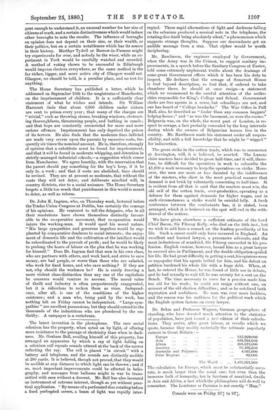Dr. John K. Ingram, who, on Thursday week, lectured before
the Trades Union Congress at Dublin, has certainly the courage of his opinions. He ventured to tell the delegates, who in all their resolutions have shown themselves distinctly favour- able to the co-operative movement, that co-operation would injure the working-man. It would spoil his moral nature. "His large sympathies and generous impulses would be sup- planted by comparative deadness to social interests ; the enjoy- ment of domestic life and the cultivation of the intellect would be subordinated to the pursuit of profit; and he would be likely to prolong the hours of labour on the plea that he was working for himself." Does Dr. Ingram find that men in his own class, who are partners with others, and work hard, and strive to save money, are bad people, or worse than those who are salaried, who work for fixed hours, and who save nothing P If they are not, why should the workmen be P He is surely drawing a more violent class-distinction than any one of the capitalists he censures would venture to assume. The moral value of thrift and industry is often preposterously exaggerated, but it is ridiculous to reckon them as vices. Independ- ence, after all, is one of the conditions of the higher existence ; and a man who, being paid by the week, has nothing left on Friday cannot be independent. "Large sym- pathies " are excellent possessions, but they should extend to the thousands of the industrious who are plundered by the un- thrifty. A ratepayer is a vertebrate.


































 Previous page
Previous page